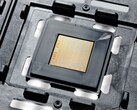Even though quantum computers are still far from demonstrating “quantum supremacy” over traditional digital computing, investments in this sector are increasing by the year. IBM is one of the companies that pioneered this field and is constantly working on improving overall performance by lowering the dreaded error rate native to quantum chips as much as possible. “Big Blue’s” latest achievement in this respect is a 53-qubit quantum computer that has more than twice as many qubits compared to the previous iteration. The improved model is part of a new quantum computing center opened in New York.
The performance boost offered over the older 20-qubit computer is supposed to increase exponentially, and the new 53-qubit model will become the largest commercially available quantum computer in mid-October. Quantum computers tend to be very noisy and the noise increases with the number of qubits, but IBM has developed a new processor, which uses more compact custom electronic components that are quieter. The new circuitry also reduces interference and the aforementioned error rates that need to be kept to a minimum if this type of processor is to replace existing regular ones, especially when the qubit count increases.
IBM Director of Research Dario Gil explains in an official statement that the goal now is to move quantum computing “beyond isolated lab experiments that only a handful organizations could do” and continue the development in order to prove that quantum computers can “ultimately solve real problems facing our clients that are not viable using today’s classical methods alone”.
To help the continued research and development, IBM already managed to secure 80 commercial, institutional and academic partnerships, and some of the clients already benefiting from the processing power offered through quantum computers include J.P Morgan and Mitsubishi Chemical.
Loading Comments
I first stepped into the wondrous IT&C world when I was around seven years old. I was instantly fascinated by computerized graphics, whether they were from games or 3D applications like 3D Max. I'm also an avid reader of science fiction, an astrophysics aficionado, and a crypto geek. I started writing PC-related articles for Softpedia and a few blogs back in 2006. I joined the Notebookcheck team in the summer of 2017 and am currently a senior tech writer mostly covering processor, GPU, and laptop news.
> Expert Reviews and News on Laptops, Smartphones and Tech Innovations > News > News Archive > Newsarchive 2019 09 > IBM presents new quantum computer with 53-Qubit CPU
Bogdan Solca, 2019-09-19 (Update: 2019-09-19)
















